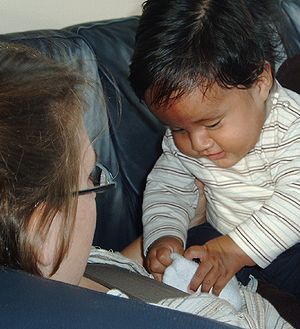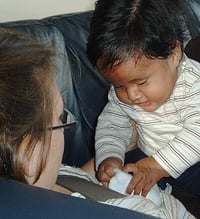Editor's Note: I'm pleased to host this reflection on adoption by Maralee Bradley. As longtime readers know, I've kept one eye on the evangelical adoption movement. This is a very personal and very difficult subject for many people, and worth considering carefully.
As the parent of a child who lived for a year in a Liberian orphanage, Kathryn Joyce’s article about the evangelical adoption movement disturbed me. It gave me that sinking feeling in my gut. You know the one---like seeing your cousin's mugshot pop up unexpectedly while watching the evening news. You knew your cousin was a little troubled, but you still feel protective of his reputation and by extension, yours.
Joyce has strong words about the ethics of the agencies and families engaged in international adoption. As an example of how that movement can go astray she speaks extensively about the adoption of children from Liberia. She details the mistreatment of those kids when they arrived in the US with more problems than their families were prepared to handle and how this led to children suffering in abusive homes, kids being shipped back, and eventually the shutdown of adoptions from Liberia entirely. This all strikes entirely too close to home for me.
You see, we’re one of those "crazy" evangelical adoptive families that anxiously filled out the paperwork, cried over the pictures of our little malnourished baby, prayed fervently when we heard he was hospitalized with malaria, and when it was all completed took a flight to Liberia to meet our son. We were shocked that within a few hours of being placed in our arms he was looking into our eyes with smiles and giggles. I cried with relief when he peacefully let me give him a bottle and rock him to sleep that first night. After four years of working with older boys from troubled backgrounds through houseparenting at a group home, we felt prepared for anything and expected our son to have struggles. We were aware that orphanage life in a war-torn country could be a recipe for attachment disaster and institutionalization issues. Before boarding the plane for Liberia we read books on bonding, adoption, and Liberian culture. We wanted to be as prepared as possible for whatever his needs might be and expected he might have trouble adjusting to life with us.
Apparently that thought process wasn't shared by many of our fellow adoptive parents.
Which is why it's hard to read Joyce's article. She isn't wrong when it comes to the sad situations some Liberian children found themselves in. They entered families who were woefully unprepared to deal with their issues and were shocked that this child wasn't grateful to have been taken from their birth culture and everything they had known. These families did not have the coping skills needed and also lacked support from their agencies to help them work through the issues they encountered. There seems to have been a feeling that a child would be better off in US foster care than in a Liberian orphanage so the agencies were prepared to match a child with a waiting family even if they had an inkling that it wouldn't last. And if they did try to explain to a waiting family that a child had issues, there was a pervasive belief among adoptive families that once they got the child home, love and good nutrition would fix all their problems.
When "love" wasn't able to conquer those behaviors and adoptions had to be disrupted, families were devastated. Obviously the adopted child was hurt. But so were the biological or previously adopted children who may have lived in fear or experienced abuse at the hands of a child who had learned terrible coping behaviors in the orphanage. It has broken my heart to see these adopted children slowly disappear from family pictures and hear whispers about behaviors no one could manage and the trauma these families experienced.
And these behaviors shouldn't have been surprising to anyone with an understanding of the events of Liberia's recent past.
Login to read more
Sign in or create a free account to access Subscriber-only content.

